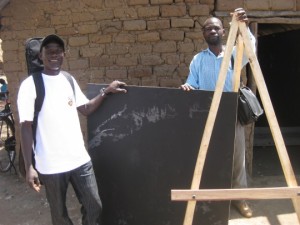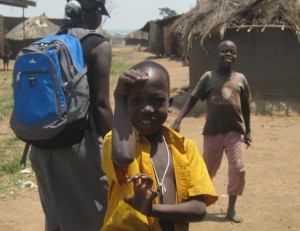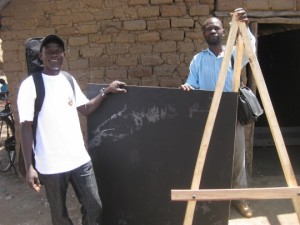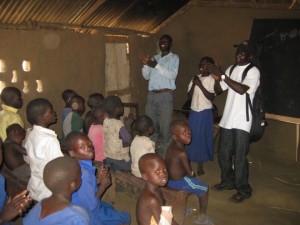
Burim Blog #3 from Uganda
Mar 10, 2011

Children Living in Pabo IDP Camp, Feb 2011, and Youth Volunteer Irene Going to Teach
Today I am writing about the Pabo Camp for Internally Displaced Persons (IDP Camp).
Last Friday I went to Pabo. The weather was very hot and the road is very dusty. It takes 2 hours to get there, either on the back of a motorcycle (called a “boda boda” taxi) or in a car if we can rent a car and driver. Luckily we arrived on time. Collins, one of our youth volunteers, came with me to help teach and translate.
Collins, who is now 24, started in our program in 2005 when Vanessa first brought the program to Uganda and held classes in his High School. In 2006 he became one of the first Youth Volunteers. After he graduated from High School, Collins went to Mukono and Mbale to study plumbing in college. Even while he was in college, Collins continued to return to Gulu whenever possible to help in the program. He is now back in Gulu, working part-time job as a plumber. Collins is hoping to get a fulltime job, but wants to continue as a volunteer in our program regardless. He is a very good teacher.

Collins (left) and Cambel Setting Up New Blackboard for Pabo Camp, March 2011
A few days ago I ordered a large Blackboard for Pabo because they didn’t have one for the school there. When we arrived at the camp, Collins and I had to walk for 10 minutes to the school—one of us carrying the blackboard and the other carrying the stands to hold the board. All the people who lived there looked at us and said, “Thank you, thank you”. At first I thought they were just greeting us, because they do greet that way, and I was replying back as “thank you”. But when Cambel, the man who is our camp coordinator volunteer came to meet us, he said that the camp people were thanking him as well, and told him to thank us also for thinking of them and for making life better for the kids who live there. I myself know how important this program is to kids, youth and adults. But the way I felt that day was really special and made me appreciate our program even more. It also made my day because I knew I was doing the right thing by going to teach there.
Cambel used to live in the camp but has now moved back to his village. But he returns every week to help us teach the children and teenagers, and he will continue the program there after I leave.

Cambel (left) and Collins Teaching Song at Pabo Camp, March 2011
We met the kids for our first class, and in the beginning there were only 18 kids but then more came, and we had around 38 kids in the singing class. They all had fun singing and clapping with me and Collins, and also laughing when I tried to speak the Acholii language. After we finished the class they asked if we could stay a little longer and sing the same songs again, so of course we did stay, and then I asked, “Is there anything more, or are we done?” And the kids asked, “Can we continue this every Friday?” and when I said “Yes” they all cheered “YEA!!” and went out running and singing the songs.
We were also supposed to have a class with the dropouts, (teenagers who have never been able to attend school and can’t read or write) but only 3 of them showed up. We had a class with them and they liked it. Collins did most of the teaching because he speaks the Acholli language. [Note from Liz: English is the official language in Uganda, but it is only taught in school, so children who can’t attend school only speak their tribal language. In the area where we work in Uganda, the tribal language is ACHOLLI]
After we got back to Gulu, Cambel called and said that the reason why the others from the dropout class did not come was that most of them thought the class was on Saturday. He asked what we should do because he was afraid that if we didn’t hold the class the teenagers might get disappointed in the program and not continue. I told him I would try to arrange something and would call him and let him know on Saturday morning. But then his phone was off when I called (because he had no electricity to charge it) so I just called a driver and went to Pabo hoping to find Cambel or the dropouts and have a class with them.
When I arrived at the camp I saw Cambel waiting with 5 of the students who had missed the class on Friday. I had a short meeting with them so that they now know the schedule, and then I taught them a class. They were embarrassed of their writing and reading, because they don’t go to school, but I told them that they just need to draw a note and write the number on how many beats it gets, they all know numbers and they all did good in drawing the notes, the names they will have to memorize for right now, but it helped them to do it this way.
So we are now teaching 4 different groups at the camp:
1—The Street Kids (young children who don’t go to school)
2—the Dropouts (age 15 and over)
3—The Adult Leaders (mostly school teachers)
4— Primary (Elementary) School children who attend the camp school
It’s going to be hard for me to teach all 4 groups in one day because of the 2-hour drive (each way) to get to the camp, and the fact that in Uganda things never start or end on time. But every time I go I can’t wait to get back there and thank everyone in the camp for appreciating our program so much.